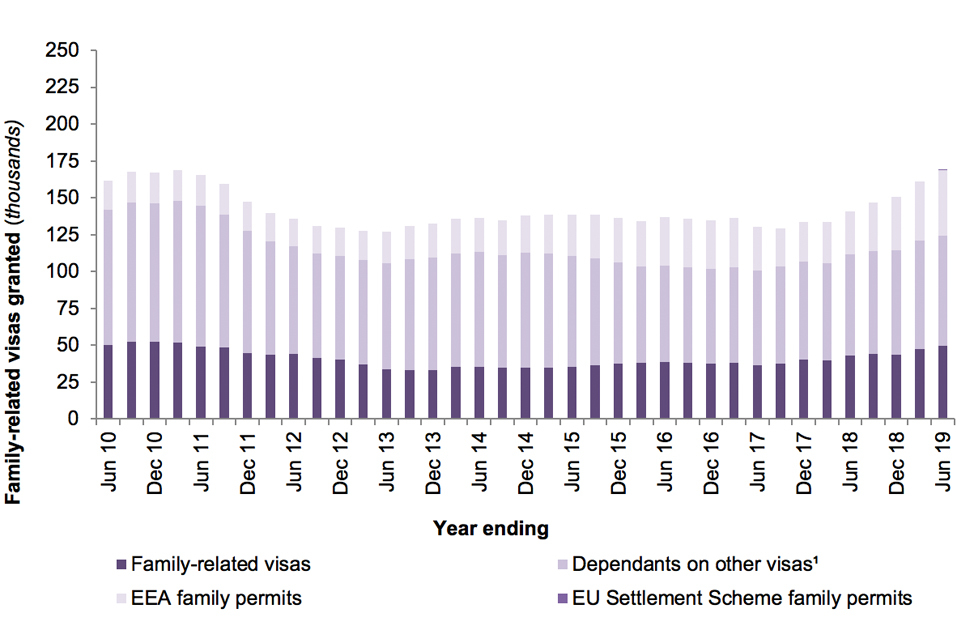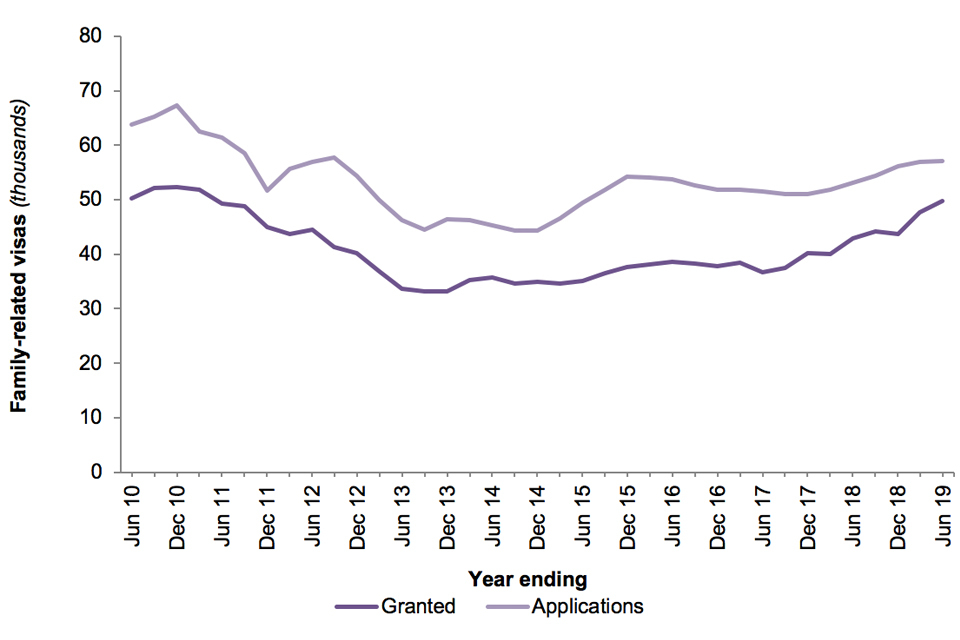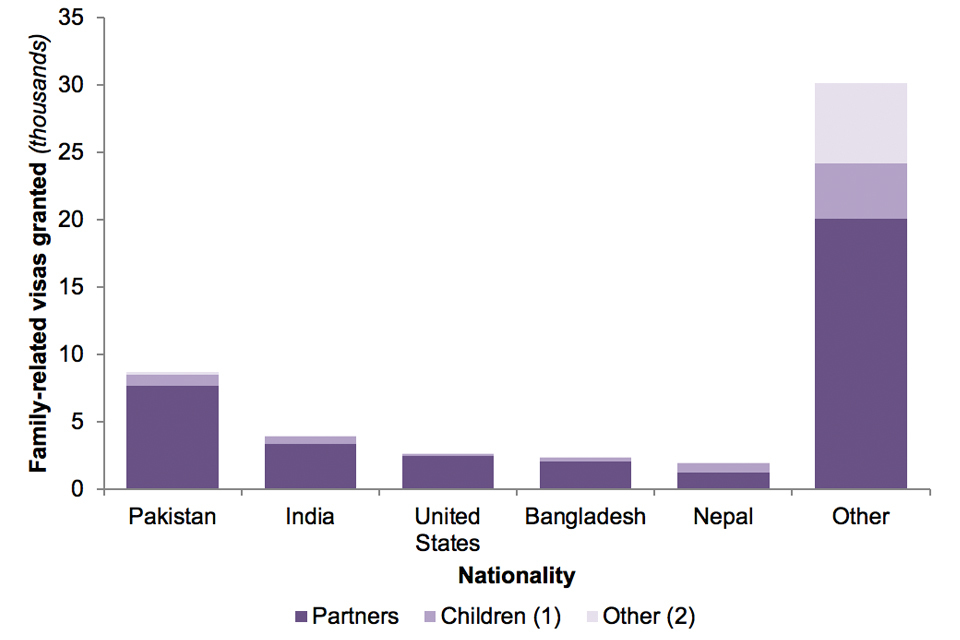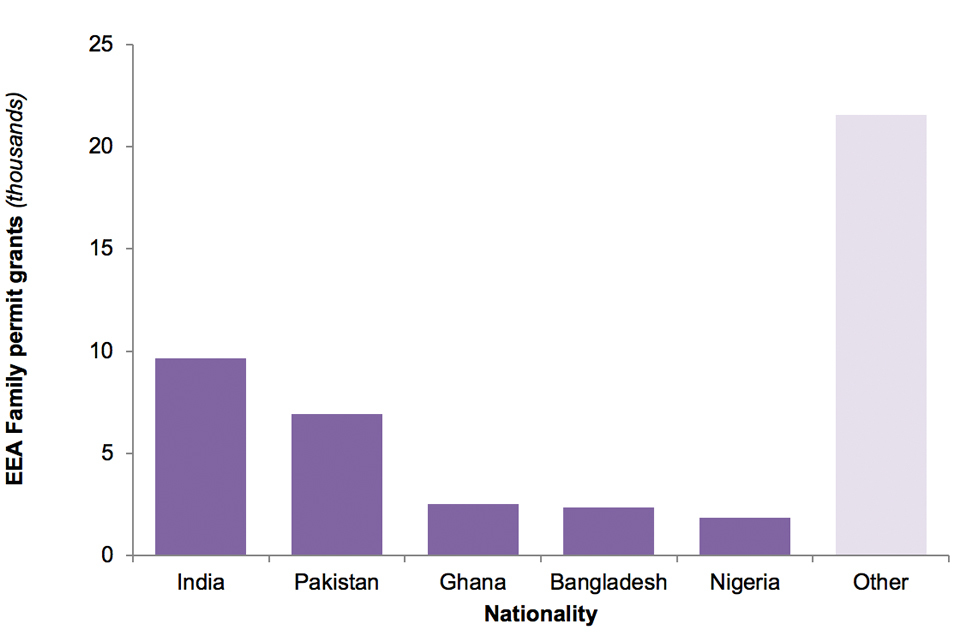Why do people come to the UK? For family reasons
Updated 22 August 2019
Back to ‘Immigration Statistics, year ending June 2019’ content page.
This is not the latest release. View latest release.
Data relate to the year ending June 2019 and all comparisons are with the year ending June 2018, unless indicated otherwise.
This section contains data on:
- Family-related Entry clearance visas
- Dependants on other types of visas (excluding Visitor visas)
- European Economic Area (EEA) Family permits
- EU Settlement Scheme Family permits
1. Immigration for family reasons
There were 169,606 visas granted for family reasons in the year ending June 2019, 20% more than in the previous year. The total included:
- 49,741 family-related visas, 16% higher than the previous year, which partly reflects the inclusion of children of a parent given limited leave to enter or remain in the UK for a probationary period in this category from December 2017 (previously included as ‘dependants on other visas’)
- 74,518 dependants of people coming to the UK on other types of visas (excluding Visitor visas), up 9%, driven by an increase in grants to dependants of Tier 2 visa holders (up 4,697 to 47,910)
- 44,825 EEA Family permits, up 53% compared with the previous year; the increase was partly driven by a rise in grants to Indian (up 2,771 to 9,655) and Pakistani (up 2,871 to 6,940) nationals
- 522 EU Settlement Scheme family permits issued to close family members of those granted settled, or pre-settled status through the EU Settlement Scheme. See section 6 for further detail on the EU Settlement Scheme
Table 1: Family-related visas and permits granted by visa type1
| Visa type | Year ending June 2018 | Year ending June 2019 | Change | Percentage change |
|---|---|---|---|---|
| Family-related visas granted | 42,933 | 49,741 | +6,808 | +16% |
| of which: | ||||
| Partners | 33,562 | 36,842 | +3,280 | +10% |
| Children1 | 3,249 | 6,558 | +3,309 | +102% |
| Other dependants | 6,122 | 6,341 | +219 | +4% |
| Dependants on other visas2 | 68,627 | 74,518 | +5,891 | +9% |
| EEA Family permits granted | 29,362 | 44,825 | +15,463 | +53% |
| EU Settlement Scheme family permits3 | z | 522 | z | z |
| Total | 140,922 | 169,606 | +28,684 | +20% |
Source:
Entry clearance visas table vi 01 q (volume 1)
Table notes:
z = not applicable.
- From December 2017, data on ‘Family-related visas granted’ to children include children of a parent given limited leave to enter or remain in the UK for a probationary period. These were previously included as ‘Dependants on other visas (excl. Visitor visas)’. The increase in grants to children in the year ending March 2019 reflects this change.
- Excludes dependants of those on Visitor visas.
- The EU Settlement scheme family permits launched on 30 March 2019.
Figure 1: Family-related visas and EEA Family permits granted1,2,3,4

The chart shows the number of family-related visas (including dependants on other visas) and EEA Family permits granted over the last 10 years.
Source:
Entry clearance visas table vi 04 q (volume 1)
Chart notes:
- Includes dependants of those coming on other visa categories (such as work and study) but excludes dependants of those on Visitor visas.
- From 29 November 2010, all non-EEA nationals applying to enter or extend their stay as a partner of a British citizen, or settled person, were required to demonstrate a level of English, except in certain circumstances. This change coincided with a fall in family-related visas granted.
- Several changes to the Immigration Rules came into effect on 9 July 2012. Further details on the rule changes can be found in the user guide and in the additional analysis provided in ‘Immigration Statistics, July to September 2014’.
- The EU Settlement scheme family permits launched on 30 March 2019.
1.1 Family-related visas
There were 49,741 family-related visas granted in the year ending June 2019, a grant rate of 78%, and now at levels last seen in the year ending June 2011 (49,263). This does not include dependants of migrants who come to the UK on other visa types (such as work, or study), which are discussed below.
Three quarters (74%) of those coming on family-related visas were partners of British citizens or settled people, and a further 13% were children of British citizens or settled people.
On 9 July 2012, a number of changes to the Immigration Rules came into effect which led to a reduction in the number of family-related visas granted, although this number had been falling prior to the changes. However, since the year ending June 2013 the number of grants has increased from 33,710. For further information on the rule changes see the Family section of the user guide.
Additional analysis on Family visas was included in the Immigration Statistics July to September 2014 release, to assist users in understanding the trends in family data before and after the changes to the Immigration Rules in July 2012 (updated in the Immigration Statistics April to June 2015 release).
Figure 2: Family-related visa applications and grants1

The chart shows the number of family-related visa applications and grants over the last 10 years.
Source:
Entry clearance visas table vi 01 q (volume 1)
Chart note:
- Grants are based on date of decision and do not necessarily relate to applications made in the same period; for example, a grant in 2018 may relate to an application made in 2017.
Pakistani nationals were issued with the highest number of family-related visas in the year ending June 2019, a 12% increase on the previous year to 8,720, continuing year on year increases since the year ending June 2014. Indian nationals were issued with the second highest number of family-related visas and saw a 17% increase in the latest year, to 3,952, and United States citizens were the third largest family-related visa nationality, with 2,636 visas.
The top 5 nationalities accounted for almost two-fifths (39%) of family-related visas granted.
Figure 3: Top 5 nationalities granted family-related visas1,2 in the year ending June 2019

The chart shows the number of family-related visas granted to each of the top 5 nationalities in the year ending June 2019.
Source:
Entry clearance visas table vi 06 q f (volume 3)
Chart notes:
- From December 2017, this category includes: children of a parent given limited leave to enter or remain in the UK for a probationary period. Prior to December 2017, they were included in Dependants joining/accompanying: child using the same visa endorsement as children joining/accompanying migrants in other routes.
- Includes Family reunion cases (pre-existing partners and minor children of persons granted refugee status or humanitarian protection).
1.2 Dependants on other visas (excluding Visitor visas)
In addition to a Family visa, other dependants of non-family-related visas can be granted a visa to join or accompany migrants who have been granted the right to enter the UK for other purposes, such as to work or to study.
In the year ending June 2019, 74,518 visas were granted to dependants on other visas (excluding visitors), an increase of 9% compared with the previous 12 months (68,627) and 30% lower than the peak of 106,723 in the year ending March 2007. Of the 74,518 granted in the latest year:
- 72% were to dependants of workers (53,434), of which the majority (47,910) were to dependants of skilled workers granted a Tier 2 visa
- 18% were to dependants of students (13,684)
- 10% were to other dependants accompanying or joining a migrant already in the UK (7,400)
1.3 EEA Family permits
Although not mandatory, an individual can apply for an EEA Family permit to come to the UK if they’re both:
- from outside the EEA and,
- applying as the family member or ‘extended’ family member of an EEA or Swiss national (excluding UK nationals)
In the year ending June 2019, there were 44,825 EEA Family permits granted to non-EEA family members of EEA nationals.
Figure 4: Top 5 nationalities granted EEA Family permits in the year ending June 2019

The chart shows the number of EEA Family permits granted to each of the top 5 nationalities in the year ending June 2019.
Source:
Entry clearance visas table vi 06 q o (volume 3)
1.4 EU Settlement Scheme family permits
From 30 March 2019, individuals can apply for an EU Settlement Scheme family permit to come to the UK if all of the following apply:
- they are outside the United Kingdom
- they are from outside the European Economic Area (EEA)
- they are not already in possession of a valid UK biometric residence card
- they are the ‘close’ family member of an EEA or Swiss national (excluding UK nationals)
- the EEA citizen they are joining has ‘settled’ or ‘pre-settled’ status under the EU Settlement Scheme
- the EEA citizen they are joining is in the UK already, or travelling with them to the UK within 6 months of the date of the application
There were 522 EU Settlement Scheme family permits granted in April to June 2019. The grant rate was 70%.
2. About these statistics
The statistics in this section provide an indication of the number of people who had an intention to enter the UK for family reasons.
Entry clearance visas allow an individual to enter and stay in the UK within the period for which the visa is valid. EEA nationals do not require a visa to enter the UK.
Data in this section refer to the number of Entry clearance visas granted for family reasons (including those issued to dependants of those travelling on other types of visas, excluding Visitor visas),EEA Family permits and EU Settlement Scheme family permits granted, within the period. If an individual was granted a visa more than once in a given period, this has been counted as multiple grants in the statistics. If an individual entered the UK multiple times within the period for which a visa was valid, this has been counted as one grant in the visa statistics.
The data do not show whether, or when, an individual arrived in the UK, what they did on arrival to the UK, or how long they stayed in the UK.
Year-on-year comparisons of the number of decisions can be affected by quarterly fluctuations in the data. Such fluctuations can be examined in more detail in the quarterly data that are available in the published tables.
Additional analysis on Family visas was included in the Immigration Statistics, July to September 2014 release to assist users in understanding the trends in family data before and after the changes to the Immigration Rules in July 2012 (updated in the ‘Immigration Statistics, April to June 2015’ release).
For figures on family-related grants of settlement as well as residence documentation issued to EEA nationals and their family members, see ‘How many people continue their stay in the UK?’. Data on the Family reunion visa category can be found in this edition’s ‘How many people do we grant asylum or protection to?’ section.
The EU Settlement Scheme family permit operates alongside the EEA family permit, which continues to provide a separate entry clearance route for those who qualify for it. The EU Settlement Scheme (EUSS) family permit facilitates entry into the UK of an eligible non-EEA citizen family member in order to join, or accompany, an EEA or Swiss citizen who has been granted settled status or pre-settled status under the EUSS. EU Settlement Scheme Statistics are published by the Home Office on a quarterly (detailed) and monthly (high-level) basis.
ONS also publishes long-term international migration (LTIM) estimates in its ‘Migration to and from the UK report’. The report includes estimates from the International Passenger Survey (IPS) on the number of people coming to the UK with the intention of staying for 12 months or more for work, study, family and other reasons. Estimates are available for EU, non-EU, and British nationals. IPS data are not directly comparable with Home Office visa data for several reasons. See the ONS article ‘Comparing sources of international migration statistics’ for details.
Further information on the statistics in this section can be found in the Visa and Family sections of the user guide.
3. Data tables
Data on family immigration can be found in the following tables:
- Entry clearance visas tables (volume 1)
- Entry clearance visas tables (volume 2)
- Entry clearance visas tables (volume 3)
- Admissions tables
- Extensions tables
- Settlement tables
We welcome your feedback
If you have any comments or suggestions for the development of this report, please provide feedback by emailing MigrationStatsEnquiries@homeoffice.gov.uk. Please include the words ‘PUBLICATION FEEDBACK’ in the subject of your email.
See section 7 of the ‘About this release’ section for more details.
